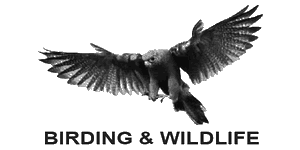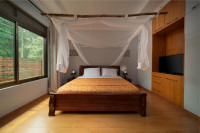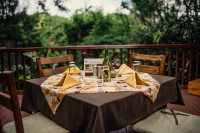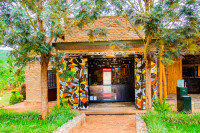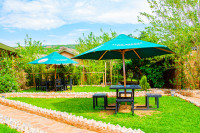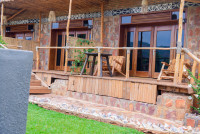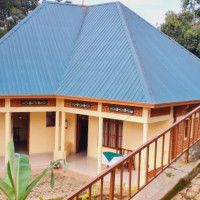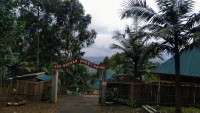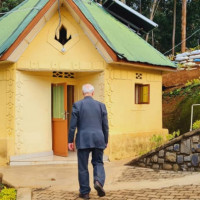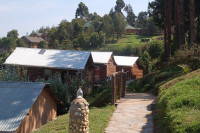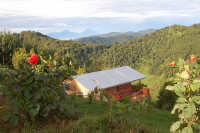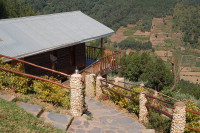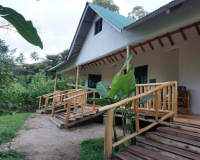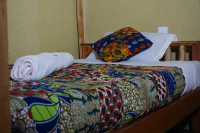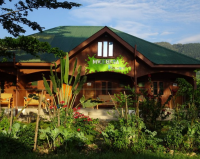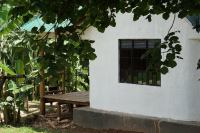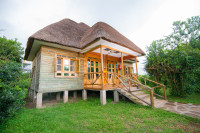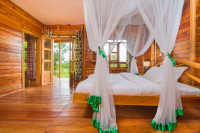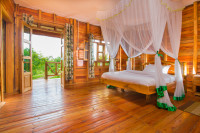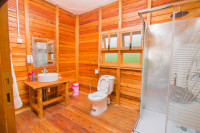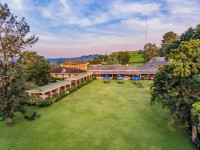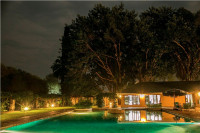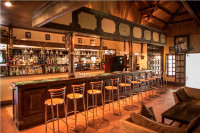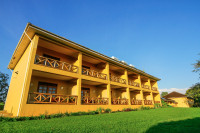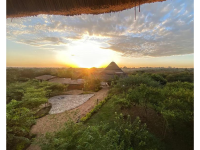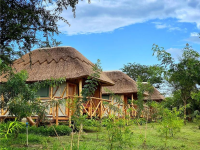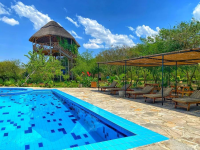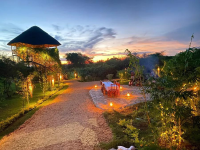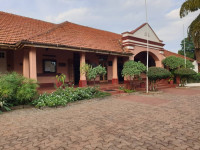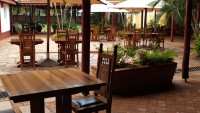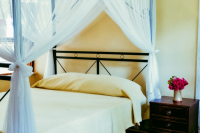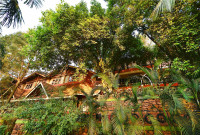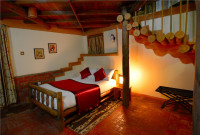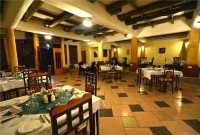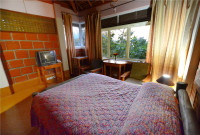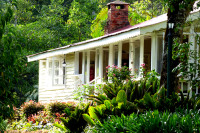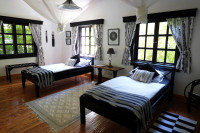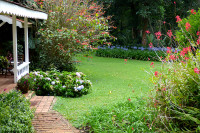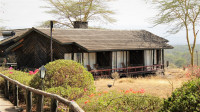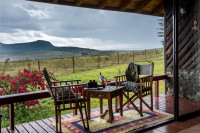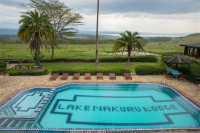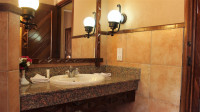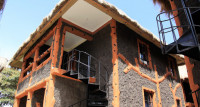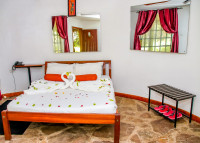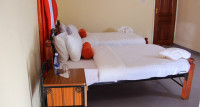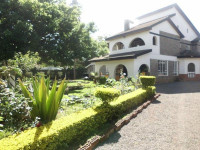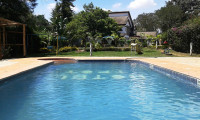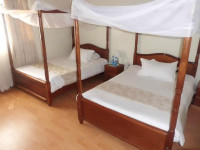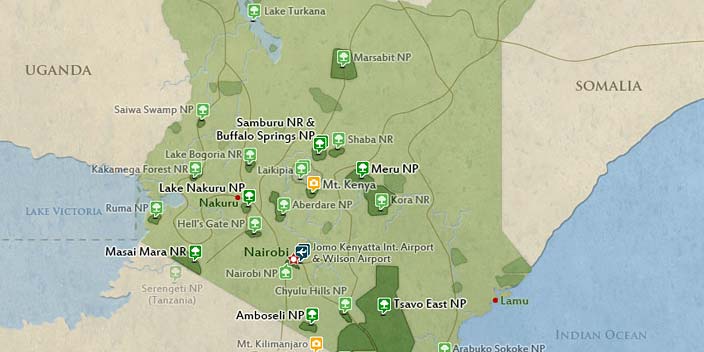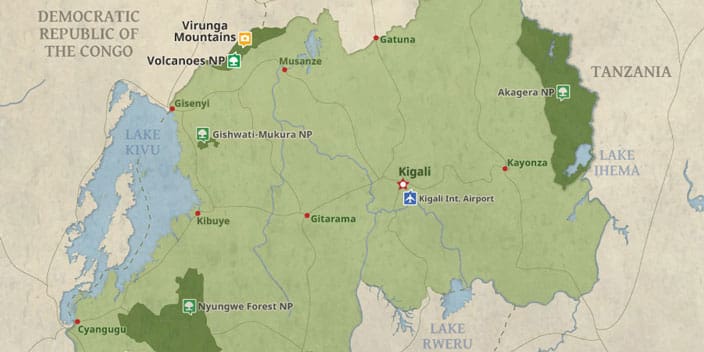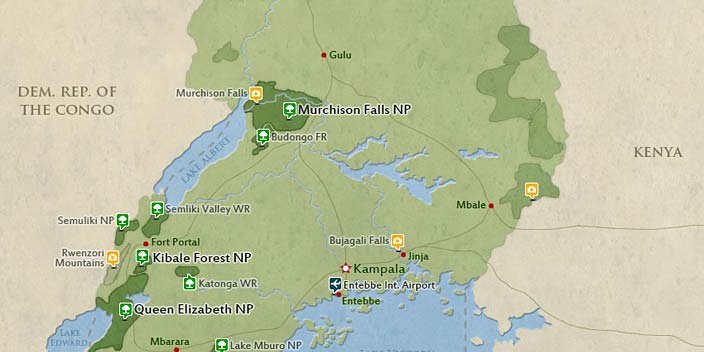
$7,159 pp (USD)
2 travelers on Start dateArrival
Arrival

Day 1
Pick-Up, Meet Your Driver-Guide and Drive to the Lodge for an Overnight Stay
Pick-Up, Meet Your Driver-Guide and Drive to the Lodge for an Overnight Stay
On arrival day, no activity but our professional driver-guide will pick you up for an introduction and drive you to the suggested hotel in Kigali for an overnight stay to shed off jetlag. The main intention is for you to relax as you prepare for the next day's activities.
- Main Destination:
- Kigali (Rwanda)
- Accommodation:
- Heaven Boutique Hotel
- Meals & Drinks:

Day 2
Birding at Nyandungu Urban Wetland Eco-tourism Park in the Morning and Afternoon Drive to Akagera NP
Birding at Nyandungu Urban Wetland Eco-tourism Park in the Morning and Afternoon Drive to Akagera NP
You will start early after breakfast and drive 10 minutes to the site. The target is to reach when the light is coming up to make it better for photographers. At the site, you will see species like; White-collard Oliveback, Spectacled, Slender-billed, Black-headed weaver, White-browed Robinchat, Cardinal Woodpecker, Marico, Scarlet-chested, Red-chested Sunbird, Klaas’s Cuckoo, Black-lored Babbler, Wattled, Violate-Backed and Ruppels starlings and other more species. On the way to Akagera on roadside stopovers, you will check on a few things like Grey, Black-headed Heron, Great White, and Little Egrets and Yellow-billed Duck paused along the way in Rwamagana Valley ponds.
- Main Destination:
- Akagera National Park (Rwanda)
- Accommodation:
- Akagera Transit Lodge
- Meals & Drinks:

Day 3
Birding and Wildlife in Akagera National Park
Birding and Wildlife in Akagera National Park
After breakfast, you'll carry your picnic lunch and go for a game drive for birding, and wildlife viewing until 6 pm. Akagera National Park, located in eastern Rwanda, is a fantastic destination for birding and wildlife enthusiasts. This park, which covers about 1,122 square kilometers, offers a diverse range of habitats including savannas, wetlands, and woodlands, making it a rich area for both birds and animals. Rufous-bellied, striated, Black-headed and African Squacco Herons, Hildabrandt’s and Red-necked francolins, Red-headed weaver, Verreaux’s Eagle Owl, Pearl-spotted Owlet, Little Grebs, Spur-winged and Egyptian Goose, Red-billed Duck, Green-winged Pytilia, Red-backed Scrub Robin, Croaking, Tabora, and Winding cisticola, Sulphur-breasted Bushrike, Lilac-Breasted Roller etc.
- Main Destination:
- Akagera National Park (Rwanda)
- Accommodation:
- Akagera Transit Lodge
- Meals & Drinks:

Day 4
Birding Transfer to Nyungwe Forest National Park
Birding Transfer to Nyungwe Forest National Park
This is a rather long journey with several spot stops to check out for some birds. Nyungwe National Park, located in southwestern Rwanda, is a renowned destination for birdwatchers and nature enthusiasts. The park is known for its rich biodiversity, including a high number of bird species like Great Blue Turaco, Black-billed Turaco, Rwenzori Turaco,
White-headed Woodhoopoe, Yellow-rumped Tinkerbird, Black-tailed Oriole, Rwenzori Batis, Rwenzori Apalis
Black-throated Apalis, Black-faced Apalis, Chestnut-throated Apalis, Red-faced woodland warbler, Rwenzori Hill Babbler, Green White-eye, Red-collared mountain babbler, Waller's Starling, Sharpe's Starling, Equatorial Akalat, Stuhlmann's Sunbird, Northern Double-collared Sunbird, Regal Sunbird, and Variable Sunbird.
- Main Destination:
- Nyungwe National Park (Chimps)
- Accommodation:
- EAR Ken Barham Guest House
- Meals & Drinks:

Day 5
Birding and Wildlife in Nyungwe National Park
Birding and Wildlife in Nyungwe National Park
You'll wake up early, have breakfast, carry our picnic lunch, and drive to Uwika Trail Bird for birding and wildlife watching. It offers an extraordinary experience with over 300 bird species. This lush montane rainforest, a biodiversity hotspot, is home to rare species like the Albertine Rift endemics. Notable birds include the Rwenzori Turaco, with its vibrant colors, and the elusive Blue-headed Sunbird. Early morning is best for sightings, as the forest's misty atmosphere enhances bird activity. Guided tours provide insights into the forest’s rich avian life and habitat. Be prepared for a rewarding but rugged adventure, as the terrain can be challenging but immensely rewarding for bird enthusiasts.
- Main Destination:
- Nyungwe National Park (Chimps)
- Accommodation:
- EAR Ken Barham Guest House
- Meals & Drinks:

Day 6
Birding and Wildlife Transfer to Uganda-Bwindi Impenetrable National Park-Ruhija Sector
Birding and Wildlife Transfer to Uganda-Bwindi Impenetrable National Park-Ruhija Sector
You will embark on the road and cross to Uganda with a lunch break in Kisoro. Driving from Nyungwe Forest in Rwanda to Bwindi Impenetrable National Park in Uganda offers a unique opportunity to experience the diverse landscapes and cultures of the region. Here’s a breakdown of the journey, along with highlights to see along the way: As you drive, take in the beautiful rolling hills and terraced farmland typical of southern and Western Rwanda. You'll experience rural life and traditional farming practices. You may encounter local markets or craftspeople. Prepare for border crossing formalities, which may include visa and vehicle inspections. The drive through the Ugandan highlands offers stunning views and a chance to see more traditional Ugandan villages and landscapes. Kigezi Highlands: This region features dramatic hilly terrain and scenic viewpoints, especially as you approach Bwindi and many more experiences.
- Main Destination:
- Ruhija Sector (Bwindi Impenetrable NP, Uganda)
- Accommodation:
- Bakiga Lodge
- Meals & Drinks:

Day 7
Birding and Wildlife in Ruhija Sector of Bwindi Impenetrable NP (Mubwindi) Optional Gorilla Tracking
Birding and Wildlife in Ruhija Sector of Bwindi Impenetrable NP (Mubwindi) Optional Gorilla Tracking
Birding in Ruhija the whole day, located in the northeastern part of Bwindi Impenetrable National Park in Uganda, is a rewarding experience for avian enthusiasts. Ruhija is renowned for its diverse bird species, including some rare and endemic ones. Key Species: African Green Broadbill: Known for its vivid green plumage and distinctive calls, Grauer’s Warbler is also endemic to the Albertine Rift and often found in the dense undergrowth. Mountain Yellow Warbler is common in higher altitudes, with its bright yellow feathers standing out against the green foliage, to mention but a few! Birding in Ruhija combines a rich avian experience with the stunning natural beauty of Bwindi Impenetrable National Park, making it a must-visit for bird enthusiasts.
- Main Destination:
- Ruhija Sector (Bwindi Impenetrable NP, Uganda)
- Accommodation:
- Bakiga Lodge
- Meals & Drinks:
Day 8
Birding and Later Connect to Buhoma Sector of Bwindi Impenetrable National Park
Birding and Later Connect to Buhoma Sector of Bwindi Impenetrable National Park
You'll carry your picnic lunch and go birding on your pace to Buhoma through the Neck and School trail. Birding in the Neck of Bwindi Impenetrable National Park, also known as the "NECK" (North Eastern Corridor of Kigezi), offers a unique and rewarding experience. This area, located in the northeastern section of Bwindi, is a key birding hotspot with a diverse range of species due to its varied habitats, which include montane forests, grasslands, and riparian zones. Scenic Beauty: The NECK is known for its lush, forested landscapes and panoramic views of the surrounding hills. Diverse Habitats: The range of habitats supports a wide variety of bird species, making it a rich area for birdwatching. Birding in the NECK of Bwindi Impenetrable National Park offers a unique chance to explore one of Africa’s most biodiverse regions, with the opportunity to see a range of rare and endemic bird species in a stunning natural setting.
- Main Destination:
- Buhoma Sector (Bwindi Impenetrable NP, Uganda)
- Accommodation:
- Ride 4 a Woman Guesthouse
- Meals & Drinks:

Day 9
Birding in Buhoma Sector and Afternoon Transfer to Queen Elizabeth National Park Via Ishaha Area
Birding in Buhoma Sector and Afternoon Transfer to Queen Elizabeth National Park Via Ishaha Area
Birding in Buhoma, located in the northwestern part of Bwindi Impenetrable National Park in Uganda, is a premier destination for bird enthusiasts. Buhoma serves as a gateway to some of the most biodiverse forest habitats in East Africa, making it an ideal location for spotting a variety of bird species, including many Albertine Rift endemics. Birding between Buhoma in Bwindi Impenetrable National Park and Queen Elizabeth National Park offers a diverse avian experience as you transition from lush montane forest to savannah and wetland habitats. This journey covers varied ecosystems, increasing the chances of spotting a wide range of bird species. Driving through the Ishasha sector of Queen Elizabeth National Park is a distinctive experience, offering a unique blend of wildlife viewing and scenic beauty. Ishasha, located in the southern part of the park, is renowned for its diverse ecosystems and distinctive wildlife, including its famous tree-climbing lions.
- Main Destination:
- Queen Elizabeth National Park (Uganda)
- Accommodation:
- Engiri Game Lodge
- Meals & Drinks:

Day 10
Birding and Wildlife Game Drive in the Morning and Afternoon Boat Trip at Kazinga Channel
Birding and Wildlife Game Drive in the Morning and Afternoon Boat Trip at Kazinga Channel
You'll have birding and wildlife in the morning until late noon. In the evening, you'll enjoy a private boat ride at Kazinga Channel. Queen Elizabeth National Park is a premier destination for birding and wildlife viewing, offering diverse ecosystems that support a wide range of species. From savannah grasslands and wetlands to forests and volcanic craters, the park provides excellent opportunities to experience Uganda’s rich biodiversity. Birding at the Kazinga Channel in Queen Elizabeth National Park is a premier experience for bird enthusiasts, offering a diverse range of species due to its rich aquatic and wetland habitats. The channel, which connects Lake Edward and Lake George, provides essential resources for a variety of bird species and is a focal point for birding activities in the park.
- Main Destination:
- Queen Elizabeth National Park (Uganda)
- Accommodation:
- Engiri Game Lodge
- Meals & Drinks:

Day 11
Optional Chimpanzee Tracking at Karinzu Forest and Birding Connecting Fort Portal Town
Optional Chimpanzee Tracking at Karinzu Forest and Birding Connecting Fort Portal Town
Chimpanzee tracking is an exciting and immersive wildlife experience that allows you to observe and interact with these intelligent primates in their natural habitat. Uganda is renowned for its excellent chimpanzee tracking opportunities, with several key locations offering memorable encounters with these fascinating creatures. Chimpanzee activity in Karinzu Forest offers an exciting opportunity to observe these intelligent primates in their natural habitat. Located in southwestern Uganda, Karinzu Forest is part of the larger Kigezi Highlands and provides a rich environment for chimpanzees. Those who won't go for the chimpanzees will stay behind strolling in the environs of Bunyaruguru and looking at the birds.
- Main Destination:
- Maramagambo Forest (Queen Elizabeth NP, Uganda)
- Accommodation:
- Mountains of the Moon Hotel
- Meals & Drinks:

Day 12
Birding in Semuliki Valley Forest National Park
Birding in Semuliki Valley Forest National Park
You'll drive for a short distance to Semuliki National Park, located in the western part of Uganda along the border with the Democratic Republic of Congo, is a renowned birding destination, especially noted for its unique avian diversity. The park encompasses diverse habitats, including lowland rainforests, savannahs, and wetlands, making it a key spot for birdwatchers interested in observing a variety of species. Birding in Semuliki National Park offers a unique opportunity to experience Uganda’s rich avian biodiversity in a variety of habitats. Whether you’re searching for elusive forest species or enjoying the vibrant wetland birdlife, Semuliki provides a rewarding and immersive birdwatching experience.
- Main Destination:
- Semuliki National Park (Uganda)
- Accommodation:
- Mountains of the Moon Hotel
- Meals & Drinks:

Day 13
Birding in Kibale Forest National Park and Later Transfer to Murchison Falls National Park
Birding in Kibale Forest National Park and Later Transfer to Murchison Falls National Park
Early in the morning, you'll report to the ranger's post to pick your guide for the pitta. You'll enter the forest for the pitta. Later, you'll enjoy birding back to the lodge for lunch and preparations to depart for Murchison Falls National Park. Observing the green-breasted pitta in Kibale National Park is a highly sought-after experience for bird enthusiasts due to the bird's elusive nature and striking appearance. The green-breasted Pitta (Pitta reichenowi) is a colorful, shy forest floor bird known for its vibrant plumage and distinctive calls.
- Main Destination:
- Kibale National Park (Chimps)
- Accommodation:
- Bamboo Village Safari Lodge
- Meals & Drinks:

Day 14
Morning Game Drive while Birding at the Northern Bank of the Nile River Afternoon Boat Trip to Delta
Morning Game Drive while Birding at the Northern Bank of the Nile River Afternoon Boat Trip to Delta
A game drive in Murchison Falls National Park, located in northwestern Uganda, is a thrilling experience that offers diverse wildlife viewing in one of the country’s most iconic parks. Spanning over 3,800 square kilometers, Murchison Falls is renowned for its dramatic landscapes, including the spectacular Murchison Falls, where the Nile River plunges through a narrow gorge. Birding in Murchison Falls National Park, Uganda, is a thrilling experience, offering a diverse range of bird species in various habitats. The park's varied landscapes—including savannahs, forests, and wetlands—provide excellent opportunities for observing both common and rare birds. Birding especially as you head towards the delta region, is an excellent choice. Murchison Falls, located in northern Uganda, offers a diverse range of bird species due to its varied habitats, including savanna, forest, and wetlands. The delta area, where the Nile River spreads out into Lake Albert, is particularly rich in birdlife.
- Main Destination:
- Murchison Falls National Park (Uganda)
- Accommodation:
- Bamboo Village Safari Lodge
- Meals & Drinks:

Day 15
Full-Day Birding in Budongo Forest the Royal Mile
Full-Day Birding in Budongo Forest the Royal Mile
You'll look for Grey Headed Olive Back, Brown Twinspot, Black Bellied Fire Finch, and more then carry on to the Mile. Birding here is excellent with an open interior and gives us unique bird species like the Ituri Batis. Lemon Bellied Crombec, Firest Warbler, Dusky Longtailed Cuckoo, Dwarf, Blue Breasted, Pygmy and Chocolate Backed Kingfisher, Western Black Headed Oriole, Red Headed Malimbe, Blue Throated Roller, White Spotted Greenbul, Rufous Crowned Eremomela, Chestnut Capped and Forest Flycatcher, Yellow Crested Woodpecker, Yellow Longbill, African Crowned-Eagle, Forest Flycatcher, Yellow-Browed Camaroptera, Grey-Backed Camaroptera, Yellow-Mantled Weaver, Red-Headed Bluebill, Sabines Spinetail, Casin’s Spinetail, Red-Tailed Anti-Thrush, Cameron Sombre, Slender Billed, Wilcock’s Honeyguides, Jameson’s Wattle-Eye, Blue-Throated Brown Sunbird, Little-Green Sunbird, Uganda Woodland Warbler, Rufous Flycatcher-Thrush and many more.
- Main Destination:
- Budongo Forest (Chimps)
- Accommodation:
- Masindi Hotel
- Meals & Drinks:

Day 16
Transfer to Kampala
Transfer to Kampala
Birding en route from Masindi to Kampala can be quite rewarding. The journey, which covers a variety of habitats, offers opportunities to spot a diverse array of bird species. Here are some species you might encounter along the way: African Fish Eagle: Common near water bodies. Village Weaver: Often seen in open areas and around human settlements. Lilac-breasted Roller: A colorful bird that can be seen in savannah and open woodlands. African Paradise Flycatcher: Found in forested areas and sometimes in open woodlands. Marabou Stork: Often seen near larger water bodies and open areas.
- Main Destination:
- Kampala (City, Uganda)
- Accommodation:
- Forest Cottages
- Meals & Drinks:

Day 17
Shoebill at Mabamba Early in the Morning and Later Drive and Cross to Kenya Via Busia Border
Shoebill at Mabamba Early in the Morning and Later Drive and Cross to Kenya Via Busia Border
Birding at Mabamba Swamp in the morning is an excellent choice for experiencing one of Uganda’s premier bird-watching sites. Mabamba Swamp, located on the western shores of Lake Victoria near Entebbe, is renowned for its rich biodiversity, including the elusive and highly sought-after Shoebill Stork. Later, you will embark on your journey to Kakamega forest in Kenya via Busia Border.
- Main Destination:
- Mabamba Swamp (Uganda)
- Accommodation:
- Rondo Retreat
- Meals & Drinks:

Day 18
Full-Day Birding at Kakamega Forest National Reserve
Full-Day Birding at Kakamega Forest National Reserve
Kakamega Forest is indeed a world-class birdwatching destination and one of the best birding sites in the entire Africa. This forest is one of the Easternmost Guineo-Congolian Equatorial Forests, which span from the Congo River basin, through Central Africa to Western Kenya.
- Main Destination:
- Kakamega Forest National Reserve (Kenya)
- Accommodation:
- Rondo Retreat
- Meals & Drinks:

Day 19
Birding to Lake Nakuru National Park
Birding to Lake Nakuru National Park
Birding at Lake Nakuru National Park is a remarkable experience due to its diverse avian populations and stunning landscapes. Located in central Kenya, Lake Nakuru is a soda lake known for its high concentrations of flamingos and other bird species that you may encounter.
- Main Destination:
- Lake Nakuru National Park (Kenya)
- Accommodation:
- Lake Nakuru Lodge
- Meals & Drinks:

Day 20
Birding at Lake Nakuru and Later Transfer to Naivasha Area
Birding at Lake Nakuru and Later Transfer to Naivasha Area
The best birding spots at Lake Nakuru include; lake shores. The shores of Lake Nakuru are prime birding locations, particularly in areas with abundant algae where flamingos gather. Baboon Cliff offers a panoramic view of the lake and is a good spot to observe birds of prey and water birds. Nakuru Escarpment provides elevated views and access to different habitats that can reveal various bird species. Surrounding areas with acacia trees are good for spotting woodland birds and raptors.
- Main Destination:
- Lake Nakuru National Park (Kenya)
- Accommodation:
- Dove Nest Lodge
- Meals & Drinks:
Day 21
Birding at Kinangop Plateau and Later Drive to Nairobi
Birding at Kinangop Plateau and Later Drive to Nairobi
Birding in the Kinangop Grasslands offers a unique and rewarding experience for bird enthusiasts, given the region's diverse avian species and distinctive high-altitude habitat. You'll look for golden-winged, eastern-double-collard sunbirds, white-backed ducks, Jackson's, long-tailed widowbirds, Sharp's Longclaw, and many others.
- Main Destination:
- Kinangop Grasslands (Kenya)
- Accommodation:
- Hotel Troy
- Meals & Drinks:

Day 22
Birding at Nairobi National Park and Later Evening Transfer to the Airport for your Return Flights
Birding at Nairobi National Park and Later Evening Transfer to the Airport for your Return Flights
Nairobi National Park is a unique and accessible wildlife haven located just a short drive from the bustling capital city of Nairobi, Kenya. It’s notable for being one of the few national parks situated within the boundaries of a major city. Nairobi National Park is known for its population of the Big Five—lion, leopard, buffalo, rhino, and elephant. It’s particularly renowned for its black rhino population, which is one of the few places where you can see these endangered animals up close near a major city. Besides the Big Five, the park is home to giraffes, zebras, wildebeests, impalas, and hyenas. It also has a small population of cheetahs and giraffes. The park is a birdwatcher’s paradise with over 400 species recorded. Notable birds include the African fish eagle, secretary bird, and various species of storks and eagles.
- Main Destination:
- Nairobi National Park (Kenya)
- Accommodation:
- No accommodation (End of tour)
- Meals & Drinks:

